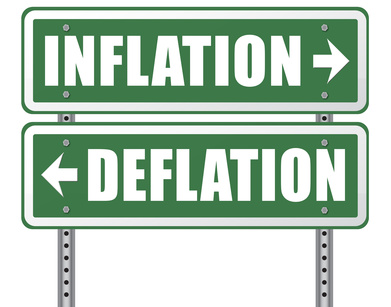The future of money, inflation, and deflation are just a few of the recent questions topics we’ve received from you, our listeners. So many great questions piled up in our email grab bag, Walter could barely carry them into the studio. Of course, Walter’s got those skinny little bird legs… So, let’s dive into your questions on real estate markets, condos, deflation, the future of money and how it affects you as an investor.
In the studio behind the silver microphones of The Real Estate Guys™ radio show:
- Your intrepid educator and host, Robert Helms
- His inept communicator and co-host, Russell Gray
- The ageless Godfather of Real Estate, Bob Helms
Choosing a Good Real Estate Market
It’s no secret that real estate prices have risen in many markets. And because of this, investors are looking for places where properties are more affordable.
Long time listeners know we think all things being equal…affordable markets will be a safer place to be in the next decade or so.
 BUT…all things aren’t equal in all markets.
BUT…all things aren’t equal in all markets.
So when a young listener asks our opinion of Detroit as a real estate investment market, we had to take a step back and discuss what makes one market preferable to another.
After all, “good” has to be answered in the context of, “Compared to what?”
So tip #1 is…pick at least two markets to compare. Not seventeen. Just two or three.
Next, look for economic drivers.
What makes that market tick economically? There should be several things. If there aren’t, then you need to move on.
Look at population and migration trends.
More people equals more demand for real estate. Growing population and people moving in means upward pressure on rents and prices….and vice versa.
Look at infrastructure.
Schools, transportation, healthcare and retail are biggies. The more and better of these essential “bones” that exist in a market, the more likely people and businesses will want to move there…or stay.
Consider the financial health of the government.
 Is it able to provide essential services, improve infrastructure and maintain an environment conducive to economic growth?
Is it able to provide essential services, improve infrastructure and maintain an environment conducive to economic growth?
A municipality that can’t afford to pay its police or maintain its roads, parks, etc…is likely to impose higher taxes now or in the future. That chases away businesses and people.
You get the idea.
Of course, with that said, because of the inherent inefficiencies in trading real estate, it’s always possible to find a deal that makes sense.
We just think fighting the local market trends isn’t worth it. As much as a hassle as investing out of area is, it’s easier than swimming upstream against a declining market.
“Live where you want to live, but invest where the numbers make sense.” – Robert Helms
Condo Conundrum
Another listener is considering investing in a residential condominium. Like any product type, there are pros and cons.
One of the positives about condos is they tend to be more affordable than single-family homes. So you potentially get more bang for your investment buck.
You also have the power of the group. Depending on the size and configuration of a complex, you can have common amenities like a pool, fitness center, tennis courts, green areas, etc.
These are things many tenants would find attractive, but the costs are shared by all owners.
On the downside, there are some things every condo investor should be aware of.
First and foremost is the financial condition of the Homeowner’s Association or HOA.
If the HOA isn’t collecting its membership dues or not collecting enough, then all those fancy amenities fall into disrepair. Or worse, essential things like roofs, driveways and landscaping can deteriorate.
When these major expenses come up and the condo association can’t pay the bill, the owners could end up getting a “special assessment”, which is essentially a cash call.
And if you don’t pay, the HOA can place a lien on your property, impeding your ability to sell the property…or worse, the HOA can initiate a foreclosure to satisfy its lien. Yikes!
Also, on the subject of HOA’s…
Be sure to look over the HOA’s meeting minutes to see if any major issues of concern are being discussed. If there’s trouble brewing, you probably want to know about it BEFORE you buy. You can’t expect that the seller or the seller’s agent have read them…much less disclosed anything problematic. Check it yourself.
It’s also important to pay attention to the percentage of renters in any given complex.
That’s because when the percentage gets too high, the condo becomes “unwarrantable”. This is lending lingo for saying that conventional lenders won’t loan on it.
Now you might not care when you buy or own, but when you get ready to sell, if your potential buyers can’t get a loan, it limits your options for getting out. This means a lower price…if you can sell it at all.
So it’s certainly possible to make money in residential condo investing…and many people do…it’s very important to do your homework BEFORE you pull the trigger.
Inflation or Deflation?
We got a great question from a long term listener wants to, know, “Is inflation or deflation coming?”
 The short answer is yes. In fact, they’re both already here.
The short answer is yes. In fact, they’re both already here.
The bigger answer is more complicated, but worth delving into because it’s very relevant to real estate investors.
Inflation and deflation affect everything from interest rates, to wages and rents, to property values...and more.
In an effort to keep it simple, we get inside what causes prices to rise or fall.
The factors which drive prices UP include appreciation, leverage and inflation. And they are all different.
Factors driving prices down are the inverse: depreciation, de-leverage and deflation.
Here are the quick definitions:
Appreciation is when more demand is out weighing supply. Depreciation is when supply is out weighting demand.
Remember, an economy is just one big auction with bidders and sellers. The more people who “appreciate” an item and bid for it…especially against a static or shrinking supply…the higher the price will rise.
Of course, if supply increases relative to demand, the sellers lower the price to attract buyers, and prices fall.
It’s true for stocks, houses, labor, commodities and pretty much everything.
But there’s more…
Inside “demand” is “capacity to pay“. After all, if you can’t afford something, it doesn’t matter how much you demand it.
This is where “leverage” comes in. And leverage dramatically affects “capacity to pay”.
When people who want something they can’t afford today with the money they already have, financing allows them to bring future earnings into the present. Those funds are used to bid UP the price.
A big part of the explosive rise in the cost of college has come from the explosion in student debt. A lot of money from the future came into the present and bid up the cost of college.
The same thing happened in housing over the decades following the Depression.
If you can find someone really old, ask them about home loans in the 40’s. They were maybe 5 or 10 years. Today, they’re 30 years. In Japan, they can be 100 years!
That’s a lot of future money (leverage) coming into the present to bid up prices.
Of course, when people can no longer afford to go into debt…or are unwilling to…then all that purchasing power goes away.
And LESS leverage means downward pressure on prices.
The third component of price change is the supply of currency (not debt, just cash) that is in circulation.
The MORE money being circulated, the more can be used to purchase things.
And if the amount of things doesn’t change, the net result is it costs MORE to buy the SAME things. This is inflation.
Of course, the reverse is true. But since the central banks control the printing presses and are committed to INFLATION, the probability of true deflation is unlikely.
But that doesn’t mean prices won’t fall. Just take a look at oil.
Because the SUPPLY of oil exploded with the fracking industry, while the DEMAND for oil didn’t grow as quickly, the price of oil dropped.
Meanwhile, because the DEMAND for properties to rent has grown (U.S. home ownership is at the lowest level since 1967) relative to SUPPLY of units available to rent (builders haven’t added as many new units as there are people wanting them)...rents have gone UP.
So for those who call rising prices “inflation” and falling prices “deflation”, BOTH are happening at the same time.
Of course, now you know there’s a lot more to rising and falling prices than just inflation and deflation.
The art is to look at anything you’re investing in and ask how ALL the factors are most likely to affect it. And then invest accordingly.
Yes, we wish it was simpler too. But it is what it is…which is why we study all the time.
Could the Yuan replace the Dollar? How would that impact the future of money?
Another topic we study is currency and the future of money.
Because most of the world transacts most of its business in…or based on…the dollar, we pay attention to it.
Lately, China’s been making moves to push its currency (the yuan or renminbi) to be on par with the U.S. dollar, the British pound and the Japanese yen.
The head of the International Monetary Fund has already publicly stated it’s not a question of if, but a matter of when this will happen.
One listener wonders what to make of all this.
Join the crowd. We spend quite a bit of time contemplating this very thing. In fact, one of the major discussion topics on our next Investor Summit at Sea™ will be “The Future of Money”.
At this stage, the trend for the demand of the dollar as a currency (medium of exchange) is actually going down.
At the same time, the supply of dollars has gone up…thanks to trillions of dollars injected into the economic system through multiple doses of quantitative easing by the Fed.
Based on that alone, you’d think the value of the dollar would FALL. After all, less demand and more supply means a falling price.
So then WHY has the dollar been so strong? And how will that impact the future of money?
Because people are using it not just as a currency, but as a store of value. So while demand for the dollar as a currency has fallen, demand as a store of value (a safe haven) has increased.
So back to the listener’s question…what happens if the yuan becomes a reserve currency?
 If the yuan becomes a reserve currency, it legitimizes its role not just as a medium of exchange, but also as a store of value.
If the yuan becomes a reserve currency, it legitimizes its role not just as a medium of exchange, but also as a store of value.
And if China backs the yuan…even partially…by gold (in addition to its substantial reserves and robust manufacturing economy)…it’s conceivable that many investors would dump dollars and buy yuan.
Consider that Britain is issuing the world’s first yuan denominated bonds. It’s just a clue that the yuan is moving ever closer to becoming a serious player on the world stage.
So if demand for the dollar falls against the backdrop of the trillions printed in the wake of the 2008 financial crisis, then the value of the dollar could fall SUBSTANTIALLY.
Worse for dollar holders, is that once the world begins to lose faith in the dollar as a store of value, the rush for the exits begins. And this exacerbates the fall of the dollar. It’s an ugly downward spiral.
What does that mean to you as a Main Street real estate investor?
The first and most likely impact will be a rapid rise in interest rates and in the dollar denominated value of anything real.
If you own real assets, like real estate and precious metals, then you’ll preserve your relative position.
The dollar value of those things will go up, but it won’t mean anything because the dollars won’t be worth as much.
It’s like that $50,000 3 bedroom house from 1970 that’s now worth $500,000.
The house didn’t get bigger or more useful. The dollar just fell, so now it takes more of them to buy the same real value.
But even though you aren’t richer in real terms, you’re better off than if you didn’t own the house. So owning anything real when a currency is losing value is a safer place to be.
Next, if you’ve used low fixed rate financing, as interest rates rise, you’re not affected.
In fact, you have a competitive edge because anyone trying to buy when interest rates are high will have to charge much higher rents in order to cover their costs.
So you can offer low relative prices to your tenants in a time of economic weakness and still be positive cash flow.
Your tenants will probably be very grateful and loyal, so you’ll have less vacancy and less hassles.
All this to say…the more you understand what’s happening, why it’s happening, how it affects you and what you can do about it…the less scary all of these changes are.
Because change is coming whether you’re ready or not…and whether you do anything or not. Obviously, it’s probably a good idea to pay attention and take appropriate action.
We’ll be here watching, reporting and commenting on the future of money and other topic. So stay tuned to The Real Estate Guys™ radio show. And if you really want to compress your learning curve, take the big leap and join us on our next Investor Summit at Sea™.
Meanwhile, listen into this enlightening edition of Ask The Guys!
Listen Now:
- Visit our Special Reports library.
- Don’t miss an episode of The Real Estate Guys™ radio show. Subscribe to the free podcast!
- Stay connected with The Real Estate Guys™ on Facebook!
The Real Estate Guys™ radio show and podcast provides real estate investing news, education, training and resources that help real estate investors succeed.













